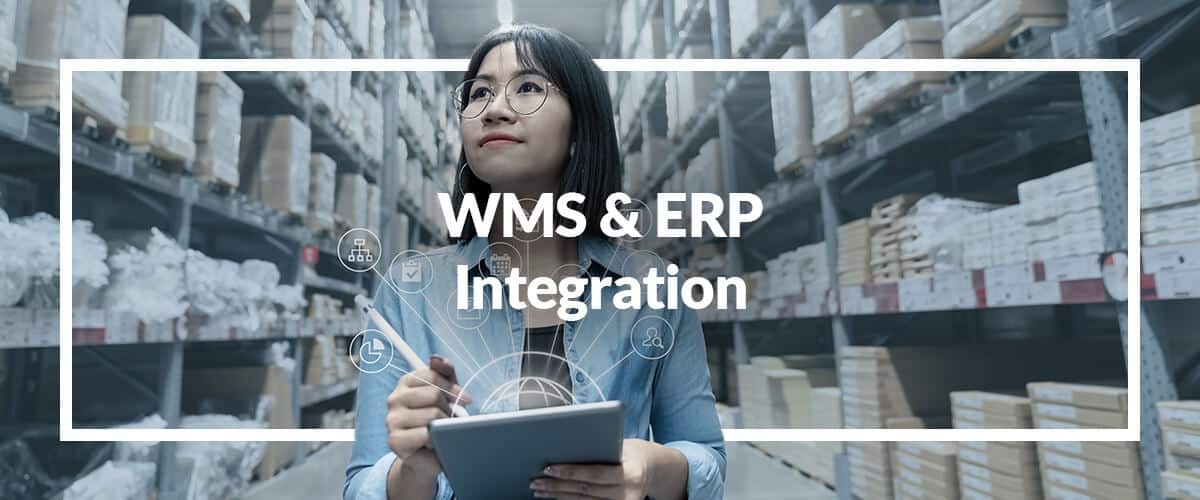Many modern warehouses utilize enterprise resource planning (ERP) systems. However, an ERP isn’t an all-in-one warehouse management tool. If you want complete warehouse management and optimization, we recommend getting the best of both worlds through a WMS ERP integration.
In this guide, we’ll explain the differences between an ERP and WMS before diving into how a WMS ERP integration can benefit your warehouse. We’ll also reveal the easiest way to integrate your ERP with a WMS to optimize your warehouse operations.
Here are the key takeaways you need to know from our WMS ERP integration guide:
- A complete WMS manages and automates warehouse processes, such as inventory transportation, sorting, storage, and retrieval.
- An ERP system controls the flow of information between an organization’s departments. It also manages finance, human resources, sales, and procurement processes.
- A WMS ERP integration connects both systems, allowing you to leverage your WMS and ERP software from a single system.
- Besides ERP systems, you can integrate ecommerce, shipping, accounting, and robotics systems with a WMS.
- It’s not possible to build a perfect ERP connector since there are many moving parts. But Logiwa’s connectors can help you improve ERP functionality and reduce ERP integration costs.
In this guide, we’ll discuss:
Warehouse Management: Your ERP Isn’t Enough
As we’ve pointed out, an ERP’s primary function isn’t warehouse management. An actual warehouse management system, such as Logiwa WMS, manages and automates inventory transportation, sorting, storage, and retrieval within your facility.
Comprehensive WMS software also tracks the packing and shipping of inventory out of a warehouse and provides reports and insights based on real-time information. Your warehouse can use the insights to optimize inventory management, processing, and movement.
An ERP, on the other hand, has limited warehouse management capabilities. The primary function of an ERP is controlling the flow of information between a company’s various departments.
It also automates business processes across departments within a warehouse. Said business processes include accounting, order entry and processing, purchasing, customer support, and other administrative and asset management functions.
In summary, you can’t replace a WMS with an ERP because both platforms offer unique features that facilitate warehouse operations. For instance, you can’t automate inventory storage, picking, and processing with an ERP, but you can do it with a WMS. But with a WMS ERP integration, you get an all-in-one tool that merges both systems to streamline and optimize managing your warehouse data and processes.

The Benefits of WMS ERP Integration
Let’s now look at what your warehouse can gain from a WMS ERP integration.
1. Experience a Single Source of Truth
A single source of truth means having one source of authoritative and reliable data. Integrating your ERP with WMS software will provide a single source of truth by synchronizing all data between the two systems, creating one reliable data source. The data between the two systems will synchronize in real-time to ensure you always have access to updated information.
Also, automatic synchronization eliminates the need for manual or double data entry. Besides easing your work, removing manual data entry prevents data entry errors that may compromise warehouse operations. Lastly, a single source of truth promotes clarity, streamlines processes, and enables better decision-making.
2. Boost Warehouse Productivity
Integrating WMS and ERP software streamlines order processing workflows. How? Your ERP system will transmit captured order information to the WMS. Your WMS will then act on the information to execute or automate your picking, packing, and shipping processes.
Optimizing your warehouse processes with data from your ERP can help reduce order fulfillment time and improve order accuracy. This leads to improved warehouse productivity and end-customer satisfaction.
3. Cost Savings and Resource Optimization
A WMS integrated with an ERP provides a holistic view of your warehouse operations and business processes. Access to such information equips you to make data-driven decisions to manage resources effectively and save money.
For example, the integration can help you keep track of inventory and forecast demand to prevent overstocking or understocking. Eliminating overstocking and understocking will reduce carrying costs and minimize the risk of financial loss from expired inventory or missed orders.
You can also use insights from the integration to optimize labor utilization and streamline workflows to save money.
How Can Your ERP and WMS Work Together?
ERP systems offer an overview of the entire company and help manage broader business processes. On the other hand, WMS systems are more specialized, focusing more on managing inventory and warehouse operations. Integrating the two systems creates a seamless data exchange that ensures accurate and updated information on both systems.
The collaboration between systems improves the efficiency of end-to-end business processes, starting with order creation in the ERP and ending with order fulfillment in the WMS.
Below are more examples that showcase how integrated WMS and ERP systems collaborate to optimize warehouse operations:
- Receive customer orders: The ERP system generates sales orders and sends them to a connected WMS for order fulfillment and inventory allocation.
- Process orders: The ERP system receives customer orders and prioritizes orders based on order type, customer priority, and delivery deadlines. The ERP sends this information to a WMS, which uses it to create and schedule picking and packing lists or instructions. The WMS also uses order information from the integrated ERP to assign pickers to specific orders.
- Get real-time updates: The WMS acquires real-time updates on inventory levels, stock movements, and order status and sends them to the ERP system. The ERP uses the updates to manage order processing and inventory.
- Manage operation costs: The ERP system can provide cost data, pricing, and other financial information to the WMS, which it will use for cost allocation and calculation of margins.
- Pull warehouse reports: Integrated WMS and ERP systems can collaborate to generate reports and analytics. The reports will provide valuable insights into the state of your warehouse operations, financial performance, and more.
How to Reach WMS ERP Integration Success With Logiwa
In a perfect world, you could use a simple ERP connector to easily integrate your ERP system with a WMS in a snap. An ERP connector is a software tool that facilitates integration between an ERP system and other applications. Unfortunately, building an ERP connector that offers seamless integration isn’t possible, as there are many moving parts.
However, using WMS software that offers integrations with your specific ERP is a great starting point. For example, Logiwa WMS offers an out-of-the-box connector with Oracle NetSuite, a leader in ERP software. By providing this integration, Logiwa WMS enhances your ERP’s functionality.
We won’t sugarcoat this process—you’ll still need a developer to ensure your WMS ERP integration works seamlessly. However, Logiwa’s out-of-the-box connectors reduce the overall cost of WMS and ERP integration, as they prevent you from starting from scratch.
Integrating Your Other Systems
Logiwa gives you complete control over your warehouse processes and more with seamless integrations for linking your existing ecommerce, shipping, accounting, and robotics systems with the WMS.
Our WMS platform also features an open API and EDI tools for creating custom connections. The best part about integrating all your warehouse systems with Logiwa is you can monitor and leverage all connected systems conveniently via the WMS mobile app.
Integrate & Optimize With Logiwa WMS
WMS integration with an ERP system can benefit your warehouse in several ways. The biggest of these benefits is providing a single source of truth and easy access to accurate, real-time data. And with Logiwa, you can start the integration process quickly with our built-in ERP integrations. To get started today, request a demo of Logiwa WMS.
Run a digital fulfillment experience with a fully integrated Cloud WMS Software
Warehouse Management
Modern digital WMS powers a modern fulfillment experience






